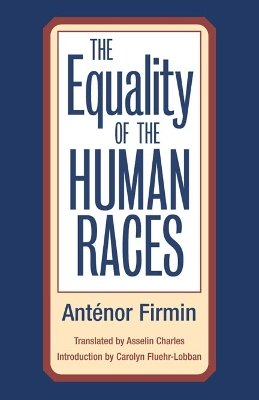11%OFF

Stock image for illustration purposes only - book cover, edition or condition may vary.
The Equality of Human Races: POSITIVIST ANTHROPOLOGY
Anténor Firmin
€ 41.99
€ 37.21
FREE Delivery in Ireland
Description for The Equality of Human Races: POSITIVIST ANTHROPOLOGY
Paperback. An important contribution to contemporary scholarship in anthropology, pan-African studies, and colonial and postcolonial studies Translator(s): Asselin, Charles. Num Pages: 536 pages, 6 b&w photographs, 12 tables. BIC Classification: JHM. Category: (P) Professional & Vocational. Dimension: 216 x 139 x 28. Weight in Grams: 625.
Rediscovering an early scientific challenge to racism
This is the first paperback edition of the only English-language translation of the Haitian scholar Anténor Firmin's The Equality of the Human Races, a foundational text in critical anthropology first published in 1885 when anthropology was just emerging as a specialized field of study. Marginalized for its "radical" position that the human races were equal, Firmin's lucid and persuasive treatise was decades ahead of its time. Arguing that the equality of the races could be demonstrated through a positivist scientific approach, Firmin challenged racist writings and the dominant views of the day. Translated ... Read more
Show LessProduct Details
Publisher
University of Illinois Press
Format
Paperback
Publication date
2002
Condition
New
Number of Pages
536
Place of Publication
Baltimore, United States
ISBN
9780252071027
SKU
V9780252071027
Shipping Time
Usually ships in 7 to 11 working days
Ref
99-1
About Anténor Firmin
Anténor Firmin (1850-1911) was born and educated in Haiti. He studied law and held several political offices before being posted as a diplomat to Paris, where he was admitted to the Societé d'Anthropologie de Paris and wrote De L'Égalité des Races Humaines. He later returned to Haiti and served as minister of finance, commerce, and foreign relations. Asselin Charles teaches ... Read more
Reviews for The Equality of Human Races: POSITIVIST ANTHROPOLOGY
"Although a reclamation of Anténor Firmin's erudite scholarship is long overdue, this translation of his late nineteenth-century book could not have been made available at a more opportune time–-at the start of a new millennium when the problem of racism persists worldwide in both old and new guises. This foundational text in critical anthropology points to the importance of expanding ... Read more
